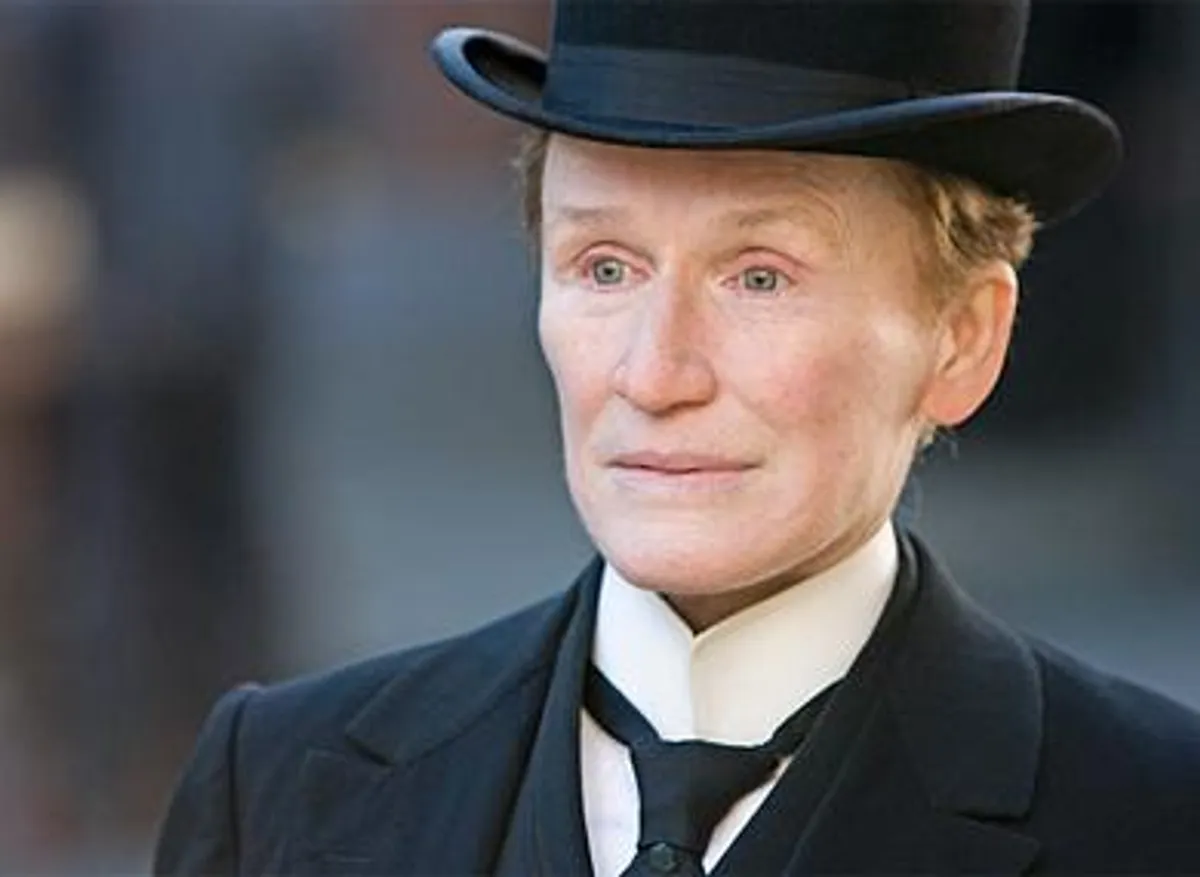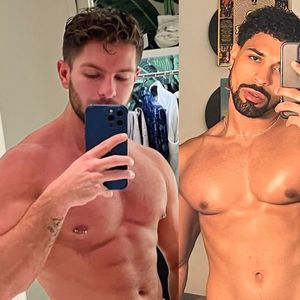
CONTACTStaffCAREER OPPORTUNITIESADVERTISE WITH USPRIVACY POLICYPRIVACY PREFERENCESTERMS OF USELEGAL NOTICE
© 2024 Pride Publishing Inc.
All Rights reserved
All Rights reserved
By continuing to use our site, you agree to our Private Policy and Terms of Use.
The film Albert Nobbs, which stars Glenn Close and is scheduled to be released in theaters late December, looks like it will present a wide range of challenging questions about gender identity, sexual orientation, and one's right to self-identify. Close plays an abused Irish woman who passes as Nobbs, a male waiter "in order to combat rampant gender and class inequality in 19th-century Dublin." Labeled as a "crossdresser," Nobbs saves his money in hopes of opening his own business, a goal he most likely could not accomplish as a woman. Some might consider Nobbs a transgender person, which may or may not be accurate depending on how you view the character and his world circumstances. The filmmakers have been adamant that the Nobbs character is not transgender.
The nuances of gender and sex frequently get lost in our narrow concepts and limited language. The widely accepted definition of "crossdresser" is an individual who wears garments traditionally reserved for the opposite sex as a means of personal or sexual fulfillment; they do not typically identify as the opposite sex and do not wish to transition or live out the rest of their lives as the opposite sex. On the other hand, a transgender man or "trans man," is an individual born with female anatomy, yet has a male gender identity, and will typically take steps to transition their social identity and/or physical body to male. This may include assuming a male name, taking testosterone, or seeking surgery such as chest masculinization. In the case of Nobbs, neither of these labels and their respective definitions seems to match his motives for passing as a man.
In today's world, we no longer use the term crossdresser to describe a female who wears masculine clothing. Thanks to feminism, women can enjoy a fair amount of latitude in terms of the style of clothing they choose to wear. Just 50 years ago, jeans were considered only men's wear, for example. However, the term crossdresser (which was frequently used interchangeably with transvestite and in some cases is still considered a mental illness), is applied to men or boys who like to wear women's clothing, even on occasion. Men continue to have much more narrow constraints in terms of what "feminine" items they may choose to wear without being stigmatized, or assaulted. The recent trial of Lawrence King's killer, and defense attorneys' arguments that Lawrence provoked his own murder by crossdressing, stands as proof.
There is a long-standing border war between crossdressers and transgender individuals. Perhaps these two separate identities sit a little too close for comfort on the gender spectrum, and members of each group have to strongly protest the existence of the other in order to claim and sustain their own right to exist. Trans women are often forced to explain that they are not, in fact, drag queens, even when popular culture often makes no distinction. Some masculine women view transgender men as traitors who merely want to access male privilege. Some transgender men, on the other hand, view butch women as being afraid to take the challenge to transition. Neither of these views is correct; the underlying issue concerns self- preservation in a world that is rapidly expanding its understanding of gender and its fluid nature. After all, a large part of American society is boycotting Dancing With The Stars simply because one the contestants, Chaz Bono, is a trans man.
Enter Albert Nobbs. He does not fit within our emerging concepts of transgender men or crossdressers. There is no neat and tidy box for us to place him in. He actually still identifies as a woman, yet somehow we find ourselves referring to him with masculine pronouns. He is a bit of threat too, since he is truly a woman posing as a man, and mainstream society sees transgender people as posers too, as if they went through all the pains of transition and live with all the discrimination simply to trick the rest of the world, hence all the bad jokes we see in mainstream media of transgender women with a deep voice, implying that they are men dressed as women and therefore the butt of jokes. Transgender activists have been working long and hard to educate people and break down the misconceptions that we are deceivers, and Albert can easily set us back. Still, Albert has the right to exist and identify however he wants, just like everyone else, without fear of harm or discrimination.
Want more breaking equality news & trending entertainment stories?
Check out our NEW 24/7 streaming service: the Advocate Channel!
Download the Advocate Channel App for your mobile phone and your favorite streaming device!
From our Sponsors
Most Popular
Here Are Our 2024 Election Predictions. Will They Come True?
November 07 2023 1:46 PM
Meet all 37 of the queer women in this season's WNBA
April 17 2024 11:24 AM
17 Celebs Who Are Out & Proud of Their Trans & Nonbinary Kids
November 30 2023 10:41 AM
Here Are the 15 Most LGBTQ-Friendly Cities in the U.S.
November 01 2023 5:09 PM
Which State Is the Queerest? These Are the States With the Most LGBTQ+ People
December 11 2023 10:00 AM
These 27 Senate Hearing Room Gay Sex Jokes Are Truly Exquisite
December 17 2023 3:33 PM
10 Cheeky and Homoerotic Photos From Bob Mizer's Nude Films
November 18 2023 10:05 PM
42 Flaming Hot Photos From 2024's Australian Firefighters Calendar
November 10 2023 6:08 PM
These Are the 5 States With the Smallest Percentage of LGBTQ+ People
December 13 2023 9:15 AM
Here are the 15 gayest travel destinations in the world: report
March 26 2024 9:23 AM
Watch Now: Advocate Channel
Trending Stories & News
For more news and videos on advocatechannel.com, click here.
Trending Stories & News
For more news and videos on advocatechannel.com, click here.
Latest Stories
In the face of tweets and turmoil, why I left the South as a medical student
April 18 2024 7:30 AM
Trans man Tee Arnold shot to death in Florida
April 17 2024 4:41 PM
Can scientific research on the causes of homosexuality be used against LGBTQ+ people?
April 17 2024 4:02 PM
George Takei releases kids' book about his childhood in internment camp
April 17 2024 3:18 PM

PLUS
ExclusivesTodrick Hall on surviving the rumors and remembering where he came from
April 17 2024 2:33 PM

Pride
Yahoo FeedHow The Pride Store celebrates National Tea Day: A tale of two brews
April 17 2024 2:14 PM













































































